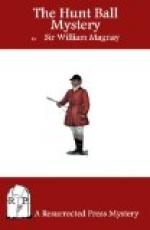“It is altogether quite mysterious,” Morriston observed with a puzzled air. “He can’t be here still.”
“Hardly,” his sister replied. “You know him?” she asked Kelson.
“Quite casually. So far as nearly coming to a rough and tumble with the fellow for his cheek in scoffing our fly at the station constitutes an acquaintance. Gifford acted as peacemaker, and we put up with the fellow’s company to the town. But neither of us imbibed a particularly high opinion of the sportsman, did we, Hugh?”
“No,” Gifford assented; “his was not a taking character, to men at any rate; and we rather wondered how he came to be going to the Cumberbatch Ball.”
“No doubt he got his ticket in the ordinary way,” Morriston said.
“It only shows, my dear Dick,” his sister observed, “you may quite easily run risks in giving a semi-public dance in your own house.”
Morriston laughed. “Oh, come, Edith,” he protested, “we need not make too much of it. We don’t know for certain that the man was a queer character.”
“One finds objectionable swaggerers everywhere,” Painswick put in.
“Anyhow,” said Kelson, “if this Henshaw was a bad lot he had the decency to efface himself promptly enough. The puzzle is, what on earth has become of him?”
“I don’t know, Mr. Gifford,” Morriston said as the two friends were leaving, “whether you would care for a ramble over the old place. A man named Piercy has written to me for permission to go over the house; he is, it appears, writing a book on the antiquities of the county. I have asked him to luncheon to-morrow, and we shall be delighted if you and Kelson will join us as a preliminary to a personally conducted tour of the house. Charlie Tredworth and his sister are coming over for a week’s stay, so we shall be quite a respectable party.”
Naturally Kelson accepted the invitation with alacrity, and Gifford could do no less than fall in with the arrangement.
“Hope you won’t mind going over to Wynford,” Kelson said as they drove back. “If it is at all painful to you from old associations, I’ll make an excuse for you.”
Gifford hesitated a moment. “Oh, no,” he answered. “I’ll come. There is no use in being sentimental about the place going out of our family, and these Morristons are quite the right sort of people to have it. A splendidly thoroughbred type of girl, Miss Morriston.”
Kelson laughed. “Oh, yes; a magnificent creature; cut out for a duchess. Only, you know, my dear Hugh, if I married a woman like that I should always be a little afraid of her. A magnificent chatelaine and all that, but too cold for my taste.”
“You think there is no deep feeling under the ice of her manner?”
“I don’t know,” Kelson replied, as though the idea was quite novel to him. “Never got so far as to think of that. I like a girl with whom you can get on without going through the process of thawing her first. And with Edith Morriston I should say it would be a slow process. Anyhow, she is just the girl for Painswick, who is evidently after her.”




